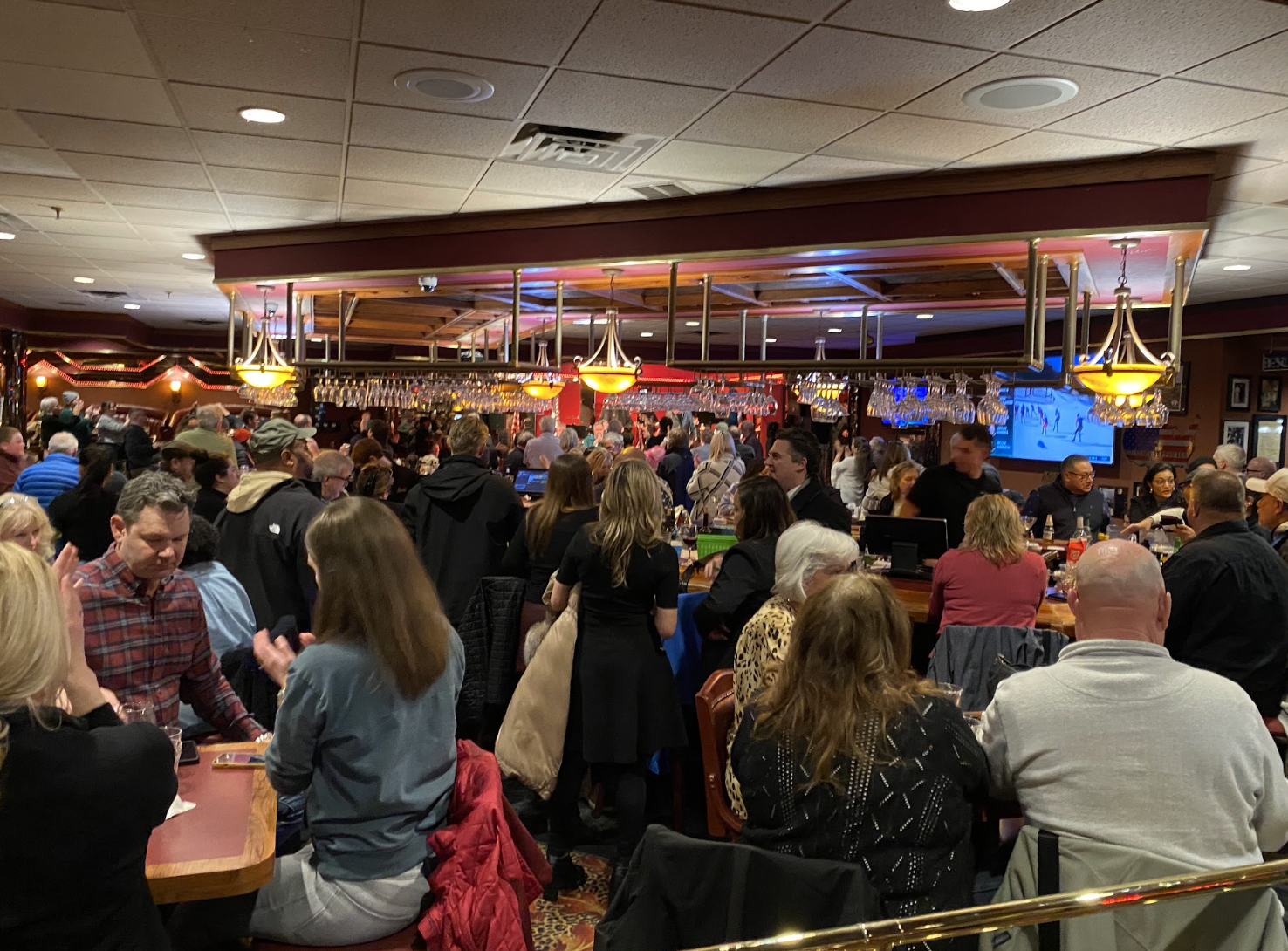The biggest movie in the country right now is a concert film. So is the year’s most newsworthy re-release. Taylor Swift’s The Eras Tour is an effective if not particularly artful presentation of popular music’s biggest superstar at what would seem to be her commercial peak. The return to theaters of Stop Making Sense reasserts its status as the gold standard for a filmed musical performance, as much for Jonathan Demme’s intimate directorial approach as for Talking Heads’ uniquely stylized presentation.
“The world is awash in music documentaries,” I wrote this time last year when I was attempting to describe the continued significance of the Sound Unseen Music + Film Festival amidst such an apparent glut of music + film combos. That statement remains just as true as the festival’s 24th year rolls around. Over the next five days, the three dozen or so films that Sound Unseen will present at four theaters across Minneapolis will counterbalance the stories about music that the movies often tell us.
Obviously, Sound Unseen has little to do with Taylor Swift’s assault on the multiplex. The biggest stars featured among its films had their pop moment decades ago: Cyndi Lauper is feted in the opening night film Let the Canary Sing, and the title of Karen Carpenter: Starving for Perfection sadly speaks for itself. Instead, chosen films typically focus on bands with smaller but intense followings, like the drone-metal pioneers Earth, or California trash-punks Redd Kross, or the heavy Swiss avant-gardists in Zeal and Ardor.
Sound Unseen has just as little to do with Stop Making Sense, which returns to us as a document from another era, where major label cash could fund a pop band as art project, and a collaboration with the right hipsters could help a director make his name. In our ever-contracting economic moment, it’s appropriate that the fest's films this year repeatedly address the state of the punk/DIY/whatever-you-want-to-call-’em scenes that we need more than ever, for artistic renewal and commercial resistance. Same as it ever was my ass.
A typical music doc is as strictly structured as a sonnet. Ambitious musicians work their way up to fame, are crushed by the fruits of their success, and then achieve bitterly hard-won wisdom (or, you know, die). And Sound Unseen isn’t without examples of this formula, such as Pete Doherty: Stranger in My Own Skin, about the troubled Libertines guitarist. Still, the most interesting storylines in the world of Sound Unseen here follow the trajectory of musicians who aren’t in this to be famous, and ask how we tell their stories. And theirs are increasingly stories of struggle.
Play By Ear: A D.I.Y. Doc, which takes a look at the Boise, Idaho, indie scene and the organizers of the Treefort Music Fest, confronts the issue of preserving an independent space for musicians head on. If you’ve never heard of the likes of Blood Lemon, Prism B!tch, and Pictoria Vark, that’s kinda the point—you shouldn’t have to in order for them to carve out a niche in their own hometown. I’m not a big one for quoting promotional materials, though this question from the doc’s PR copy really does sum up the issue: “Can independent art and a DIY ethos thrive in a world that seems less hospitable by the day?”
The key word there is “thrive.” Exist? Well, sure, people can exist while performing all sorts of fringe tasks. There will always be musicians, both amateurs who survive by other means and professionals who can scrape up some kind of living. The question is whether there be a space from which they can derive energy and support. In the past, finding such a space was partly the point in living in a town like Boise (or Minneapolis, for that matter).
Anecdotally, I’ve noticed a recent increase in musicians, who once thought themselves part of an “alternative” or “bohemian” world even if they’d die rather than use either adjective, calling themselves “working class.” There’s some resignation in that, as a special artistic class recognizes that there is no protected space beyond the reach of capital. Yet there’s also a potential strength that comes from accepting that you’ve been proletarianized. I think they call it “class consciousness.”
You can hear that consciousness in the piano-driven rock revivalism of the Philadelphia band Low Cut Connie, whose music has progressed from party ravers to vignettes of gig workers scraping by without losing any of its flair. So it makes sense that music making as a working class career (or as an independent business, if you prefer) comes to the fore in Art Dealers, directed by the band’s charismatic frontman, Adam Weiner. As Weiner mounts a three-night stand in New York City, Art Dealers essentially becomes a concert film about how hard it is to stage a concert.
This year’s Sound Unseen selections help put the transformation of punk/DIY spaces over the years in historical context. Take Louder Than You Think: A Lo-Fi History of Gary Young and Pavement, a film about the first drummer for a band that epitomized a certain ’90s indie ethos. Gary Young was more than a decade older than the rest of Pavement—he wasn’t exactly a kid back when he was coaxing punk bands to come to Stockton a decade earlier. He was one of those guys you don’t see so much anymore but were a staple of indie scenes back then: the older, sometimes a little unstable guy who lingered past his supposed moment, serving a social and artistic purpose by bridging generations.
With that in mind, it’s an ideal time to revive The Punk Singer, the documentary about Kathleen Hanna that’s screening in honor of its 10th anniversary. One thing Hanna seemed particularly conscious about when Bikini Kill played the Palace Theatre in St. Paul earlier this year was crossing generational lines. The show itself was mixed by age, with plenty of mothers and daughters in attendance together.
And we encounter what’s practically a history of punk scenes in Scream of My Blood: A Gogol Bordello Story. Frontman Eugene Hütz is one of those ferociously energetic figures who thrive in such smaller settings as Burlington, Vermont, where his family wound up after fleeing what was then the U.S.S.R. Not all of them have talent, fewer have vision, and even fewer still have the focus to put that talent and vision to use. (I caught one of Gogol Bordello’s early cabaret-style shows in Philly and I can attest that it was mind-expanding as folks here say.) Once a champion of a borderless world who brandished the word “gypsy” as an emblem of his Romani heritage, Hütz has (understandably) become a fierce Ukrainian nationalist in recent years. That’s an… irony seems too strong a word, so let’s just say “development” that the film doesn’t address squarely: the question of punk ideals facing the brutal realities of geopolitical power.
On its latest album, Solidaritine, Gogol Bordello signals its renewed punk commitment by covering Fugazi, the post-hardcore band that set the standard for unflinching underground principle. We Are Fugazi From Washington D.C. shows you why that is—when people romanticize the ’90s underground, this is what they’re remembering. Basically, anyone who wanted to tape a Fugazi show could, which means there were hours of tape from which curators could pull from to demonstrate righteous (note that I did not preface that with “self-”) energy the band and its fans harnessed. The film follows from early shows where it’s hard to tell where the stage ends and the audience begins to larger club shows, and it illustrates the band’s changing ways of addressing their audience and policing the occasional meathead in the crowd. It was great on my laptop, which is very much not how it will be best experienced.
Few bands of the 20th century era are as well-documented as Fugazi; nowadays, even an upstart hardcore band that no one will remember six months after it breaks up might have all its shows captured on someone or other’s phone. You have to wonder what future concert films could be fashioned from the limitless stream of video floating around on social media. You could even say that the concert film has been democratized, though maybe it’s more accurate to say it has been privatized. We’re all documentarians, but we create for an audience of one.
Bootlegging with permission is an idea once only embraced by punks or hippie holdovers like the Grateful Dead. Now tech has made the practice uncontrollable, and the concert film has been open-sourced—an enterprising editor could have crafted a version of the Eras Tour from TikToks, and it would certainly have been more original than what’s in theaters. Except, of course, that SwiftCorp. Intl. would never permit a director to do that, and an authorized version would mean signing over all those individual moments of creation to the star herself.
In other words, not only are the spaces where artists can create economically policed, and the means of communication under corporate control, but the pop culture that makes up so much of our collective consciousness is off-limits material. Which brings us to The People’s Joker. Though there’s nothing even tangentially music-related about this subversive little movie from Vera Drew and Bri LeRose, it fits in at Sound Unseen because it confronts issues that no artist or culture worker can ignore. With a mix of live action and animation, the film plunges us into a world where a version of Saturday Night Live controls all access to comedy and a trans woman emerges in opposition as the Joker.
Of course The People’s Joker immediately ran into “rights issues” after premiering at the Toronto Film Festival last fall, and part of its success is simply the audacity of its very existence. In fact, it creates its own rationale for existing by bending the DC Universe to its imaginative needs: Batman is a fascist groomer, every supervillain is a standup comic, and Jason Todd’s Robin is a manipulative trans man who resembles Jared Leto’s Joker. With its ironic aughts aesthetic, a jumble of Adult Swim and Tim & Eric and Tumblr visual techniques, this movie just looks illegal. To describe it in any further depth would ruin the fun.
I’m not sure I would have thought to compare The People’s Joker to Todd Haynes’s Velvet Goldmine if the latter wasn’t also part of this year’s Sound Unseen, to commemorate its 25th anniversary. Like Drew and LeRose, Haynes remixed and reimagined a world (in his case, the glam scene of the ’70s) to make it more explicitly queer. Unlike Bruce Wayne, though, David Bowie was a real person, and he chose not to participate in Haynes’s project. So Velvet Goldmine suffers from an IP deficiency—Bowie’s music was off limits, necessitating the use of lesser pastiches and leaving it with all the pitfalls of a music biopic without the actual music to redeem them.
Heh heh, just wanted to be a little nasty to something in the festival so I can retain my status as an, ahem, independent voice here. If Haynes’s film is a complicated, often astonishing mess (in this Year of Barbie, I’d personally prefer to rewatch his Superstar: The Karen Carpenter Story), what matters is that he recognizes that popular culture is the stuff of our identities and fantasies. DIY spaces could never quite be havens from the world of commodified art they once had an easier time pretending to be, after all, and maybe now the best best way to defend our art spaces is to insist that the larger cultural world belongs to all of us as well. Seeing a bunch of movies in conversation with each other will make a guy start wondering things like that.
Sound Unseen begins on Wednesday, November 8, and runs through Sunday, November 12. You can find all the info you need here.






